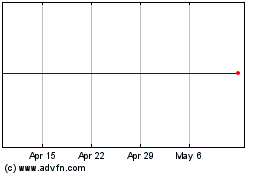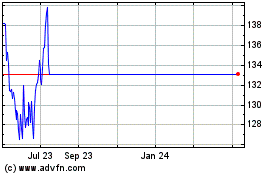Hard Drive Shortages Giving Solid State Drives A Boost -LSI CEO
December 23 2011 - 1:04PM
Dow Jones News
Solid state drives are getting a near-term boost from hard-disk
drive shortages, the chief executive of chip maker LSI Corp. (LSI)
said, though he doesn't expect the shortfall to have a long-term
impact on the market.
The worst flooding in decades in Thailand dismantled or damaged
a large chunk of the world's hard-drive manufacturing operations,
causing a shortfall of the storage devices used in PCs and data
center products. As a result, some computer makers are turning to
solid state drives, which use flash memory and offer faster speeds
and better battery life.
Abhi Talwalkar, chief executive of chip maker LSI, said in an
interview last week that companies are looking to solid state
drives to fill some of the hard-drive shortfall, but he cautioned
the shortage "is so big that solid state drives aren't going to
close the gap."
The industry is expected to see a shortage of about 50 million
units in the fourth quarter and further shortfalls in the first
half of 2012.
LSI shares slid 2.3% to $5.92 in recent trading.
Many other components makers also have said solid state drives
are getting a boost. Intel Corp. (INTC) Chief Financial Officer
Stacy Smith earlier this month said solid state is one of the ways
the industry will try to offset hard drive shortages.
Flash memory provider SanDisk Corp. (SNDK) and storage chip
maker Marvell Technology Group Inc. (MRVL) have made similar
comments. And memory maker Micron Technology Inc. (MU) on Wednesday
said it has seen higher demand for solid state drives, particularly
in consumer PCs, because of the hard drive problems. The company
reported a 60% quarter-over-quarter jump in solid state drives for
its period ended Dec. 1.
The flooding "happened during what's normally a strong seasonal
demand period for [PC makers], right in the middle of shipping into
the channel for the holidays," Chief Executive Steve Appleton said.
"So we saw a pretty strong uptick."
But there are some doubts about how much of a boost solid state
drives will get or what impact the hard-drive shortages will have
on their long-term use. The flash memory products already were
seeing increased adoption due to thinner and lighter PCs like the
Apple Inc. (AAPL) MacBook Air and "Ultrabooks" pushed by Intel
Corp. (INTC), and they still cost significantly more than hard-disk
drives.
In addition, solid state drives are not only used in PCs but
also are increasingly being installed in data centers to accelerate
the transfer of information. In particular, financial services and
Internet companies have been leading the adoption of flash
technology, Talwalkar said.
"There is broad adoption starting to take place," Talwalkar
said. "Next year is going to be a meaningful inflection point
relative to the adoption of flash."
He noted units will start to ship in higher volumes while prices
will decline. In addition, the overall reliability of flash is
starting to improve, Talwalkar said, something that also should
boost the market.
LSI has gone through a transformation in recent years, moving
away from its diverse offerings and manufacturing operations to
focus on providing chips for networking and storage, including
hard-disk drives. The company earlier this year reached a deal to
shed its external storage systems business for $480 million to
data-storage gear maker NetApp Inc. (NTAP) and it also bought flash
memory chip provider SandForce Inc. to give it broader exposure to
solid state drives.
Talwalkar said the hard-disk drive industry will likely produce
about 125 million to 130 million drives in the first quarter and
ship the entire supply. But Talwalkar said that's likely below
demand of about 160 million to 170 million hard-disk drives.
He said the number of units built in the second quarter will be
"significantly higher," but inventories likely won't be replenished
until the second half of 2012.
Storage and server vendors likely will receive top priority for
drives, Talwalkar said, as will PCs. The areas expected to be hurt
the most include retail, external storage drives and consumer
electronics, he said.
LSI also sources certain components from Thailand, and Talwalkar
said the company has improved its supply chain enough to meet most
demand from hard-disk drive customers.
"For the vast majority of [models], we're not holding up their
ability to build drives," Talwalkar said. "But there are one or two
hot spots we continue to work on to improve."
-By Shara Tibken, Dow Jones Newswires; 212-416-2189;
shara.tibken@dowjones.com
Life Storage (NYSE:LSI)
Historical Stock Chart
From Mar 2024 to Apr 2024

Life Storage (NYSE:LSI)
Historical Stock Chart
From Apr 2023 to Apr 2024
